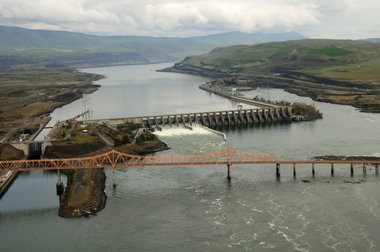forum
library
tutorial
contact

Army Corps of Engineers say 474 Gallons of Oil
Could Have Spilled into Columbia River
by Molly Harbarger
The Oregonian, March 29, 2018
|
the film forum library tutorial contact |

|
Army Corps of Engineers say 474 Gallons of Oil
by Molly Harbarger
|
 The Army Corps of Engineers reported late Wednesday that 474 gallons of oil is missing and could be in the Columbia River downstream of The Dalles Dam.
The Army Corps of Engineers reported late Wednesday that 474 gallons of oil is missing and could be in the Columbia River downstream of The Dalles Dam.
Employees at the dam said the oil disappeared from a turbine that generates electricity from running water, but they don't know where it went or when it went missing. It could have occurred anywhere from Feb. 7 to March 22.
There's also a chance the spill ended up within the facility without entering the river, said Tom Conning, a corps spokesman. Staffers have not spotted any oil sheens, though it's possible the oil simply mixed in with the moving river.
The Army Corps notifies the Columbia River fishing tribes, some environmental groups, as well as the state of Washington, when these spills occur. Sometimes the leak is as small as a tablespoon, sometimes it is a few hundred gallons.
If the oil is in the water, Conning said he didn't know whether there would be any attempt to contain the oil.
"It probably depends on several different factors, but I don't know the specific response," Conning said.
Curt Hart, spokesman for the Washington Department of Ecology, said the oil would be near impossible to clean up, because it quickly disperses and then dissipates.
The turbine leaked a light mineral oil that would spread quickly over the surface of the water, suffocating life below it, Hart said.
Washington, which oversees The Dalles Dam, considers anything more than 25 gallons to be a significant amount of oil. Hart said 474 gallons is quite large, and while not catastrophic, any amount of oil in the river causes damage to fish and other life.
The state cannot demand the Corps pay a fine the way it would penalize a private company or public utility, because the Corps is under the military department and has sovereign immunity.
However, the state wishes the spills would stop.
"It happens with more frequency than we would like," Hart said. ACOE "For us, our first goal is to prevent spills from happening in the first place. There's really no oil spill that's an acceptable oil spill."
Lauren Goldberg, attorney for Columbia Riverkeepers, said that bigger spills happen more often than they should. Last year, 1,600 gallons of oil was spilled at the Lower Monumental Dam on the Snake River in Washington, which connects to the Columbia River.
"The Army Corps clearly can't control oil spills from the dams, which is why the Corps needs to start using eco-friendly oil," Goldberg said. "If oil spills happen, let's make sure it's not harmful, toxic oils like the Army Corps' history on the Snake River."
The Army Corps is supposed to decide soon whether to switch to less environmentally damaging oils in its operations, after a study it conducted as part of a settlement with the Riverkeepers.
The settlement also called for the Army Corps to apply for water quality permits from the U.S. Environmental Protection Agency, which could require the Army Corps to monitor or reduce pollution. The Corps has, but has not received the permits yet.
"People care deeply about the Columbia River and are investing in strong salmon runs now and into the future and the Army Corps needs to take responsibility for its oil spills," Greenberg said.
Tribal fishing crews have not reported seeing oil in the river, said Chuck Hudson of the Columbia River Inter-Tribal Fish Commission. As salmon season begins, tribal members who make their livelihood fishing the river are especially concerned about real or perceived effects of oil on fish and water quality.
Hudson said the tribes' involvement in clean-up is determined on a case-by-case basis.
The fish commission alerts fishing crews, as well as people who llive along the river year-round and during fishing season, when there are spills or the risk of one. This is to ensure they are extra cautious about the fish they eat and sell.
"We want, of course, data first and then assurances that the fish they are catching and consuming safe," Hudson said.
learn more on topics covered in the film
see the video
read the script
learn the songs
discussion forum
